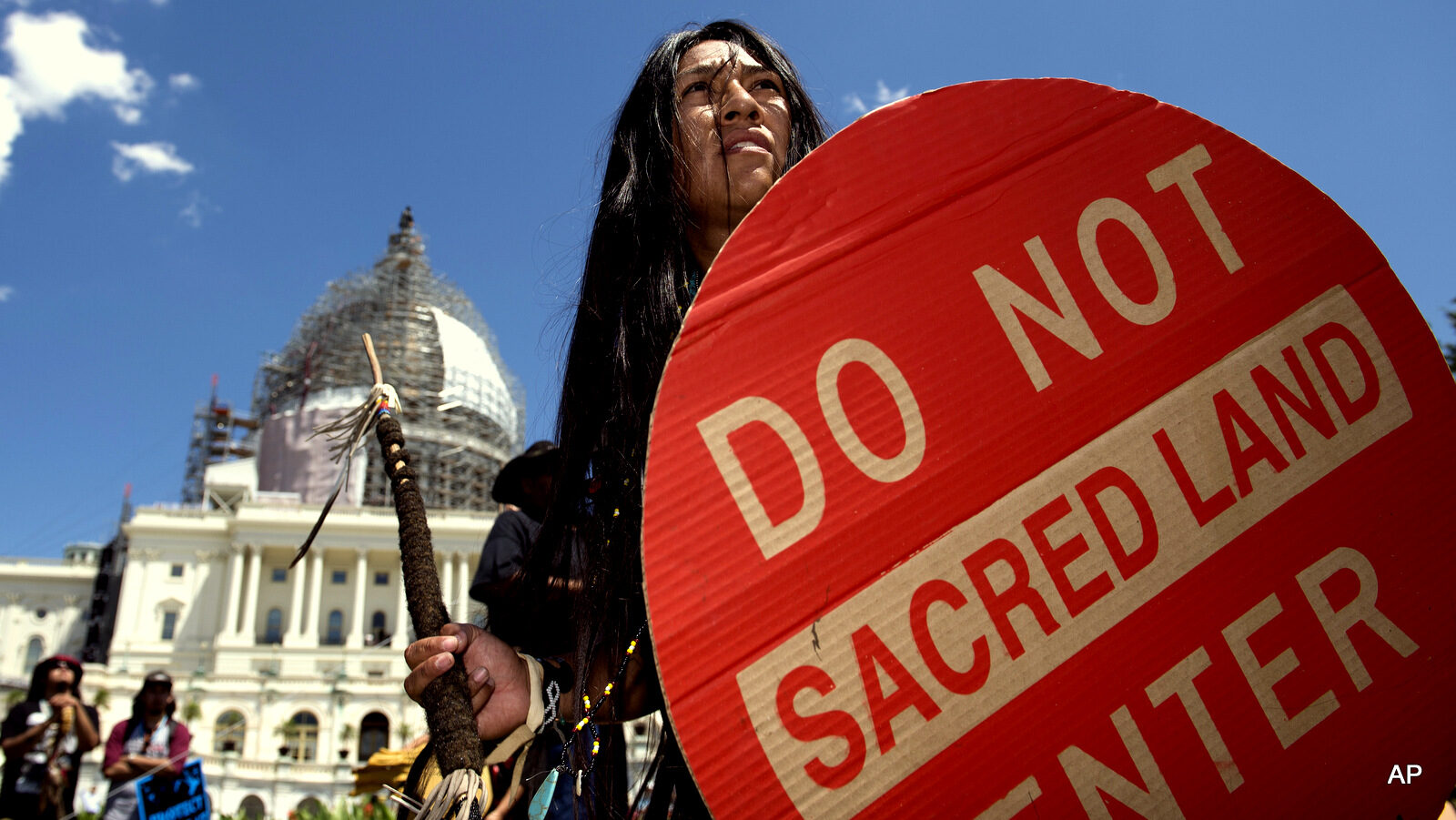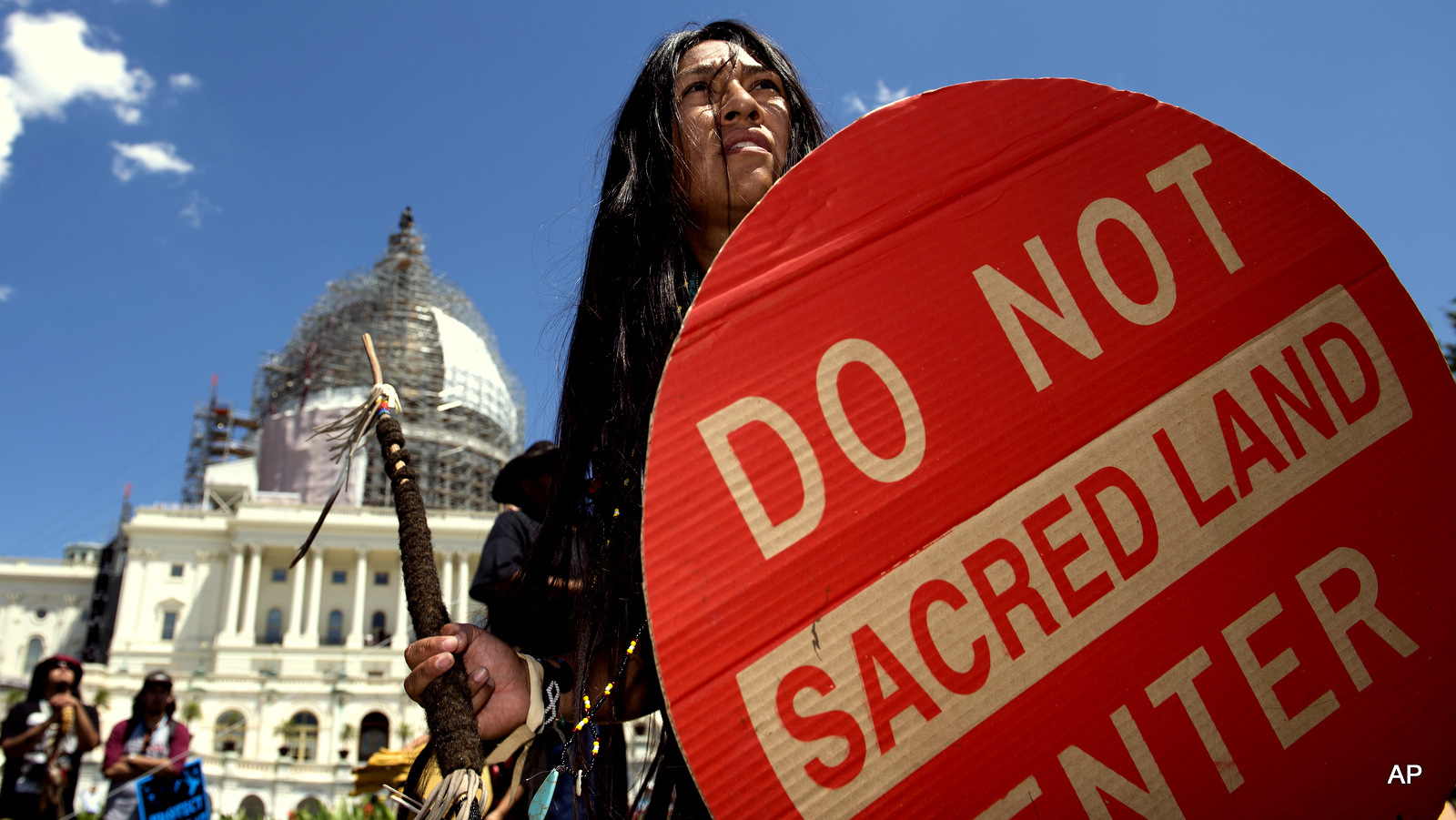
OAK FLAT, Arizona –— The San Carlos Apache Tribe held a celebratory dinner on July 27 to welcome back members of the Apache Stronghold caravan after a two-week journey from the tribe’s reservation in Bylas, Arizona, to Washington, D.C. The dinner menu featured a traditional Apache acorn soup and juice squeezed from skunkbush sumac berries — both of which are threatened by a proposed $6 billion mining operation.
The Apache Stronghold formed in December in response to a last-minute legislative provision included in the the National Defense Authorization Act of 2015. The provision at issue in the annual Defense Department funding bill grants Resolution Copper Mining, a subsidiary of Australian-English mining giant Rio Tinto, a 2,400-acre land parcel which includes parts of the Tonto National Forest, protected national forest in Arizona where it will create the continent’s largest copper mine.
Some of those lands are considered sacred by multiple Native American communities, including the Oak Flat campground. The area is not recognized as part of the San Carlos Apache Reservation, but it has historically been used by the Apache for trading purposes and spiritual ceremonies.
“This is appalling, this would not happen at any other holy place in the world,” Reddog Rudy, an Apache Stronghold supporter with the Xicano, Ute and Pinoy Nations, told MintPress News. “If someone tried to extract minerals from the Vatican or from Jerusalem it would be seen as an abomination.”
The National Environmental Policy Act stipulates that an impact assessment on the environment, archaeological and historic sites, as well as spaces considered sacred by Native Americans, must be completed prior to a land swap. However, under the NDAA 2015, Resolution Copper will be awarded the land 60 days after the required environmental impact statement has been completed. This raises questions about whether a fair assessment can be completed when Resolution Copper has already been awarded the land for the proposed copper mine.
”The bill says that Congress has already decided that the land swap will take place. So we’ll do the land swap and then we’ll do NEPA,” Jeffrey Altschul, president of the Society for American Archaeology, is quoted by Science magazine as saying in December.
The mine has the support of Arizona Reps. Paul Gosar and Ann Kirkpatrick, as well as Arizona Sens. John McCain and Jeff Flake. Originally introduced in 2005 by Arizona Rep. Rick Renzi, the Southeast Arizona Land Exchange has consistently faced opposition from the San Carlos Apache. Following the passage of the land swap policy rider in the NDAA 2015, Flake commented on the need to include the measure into the much larger NDAA rather than passing the bill on its own.
“It’s never good to see big packages with so many things in them — that’s what we want to get away from,” Flake told the Huffington Post. “But it’s been very difficult to move individual pieces of legislation over the last few years.”
The passage of this particular piece of legislation had been “very difficult” partly because of the threats to Apache land, history and way of life, as well as environmental concerns.
Rudy was one of hundreds of supporters who joined the Apache Stronghold as they traveled to reservations across the country in an attempt to drum up support for their fight. The Stronghold stopped for ceremonies and rallies in cities across the country before finishing their journey outside of the Capitol.
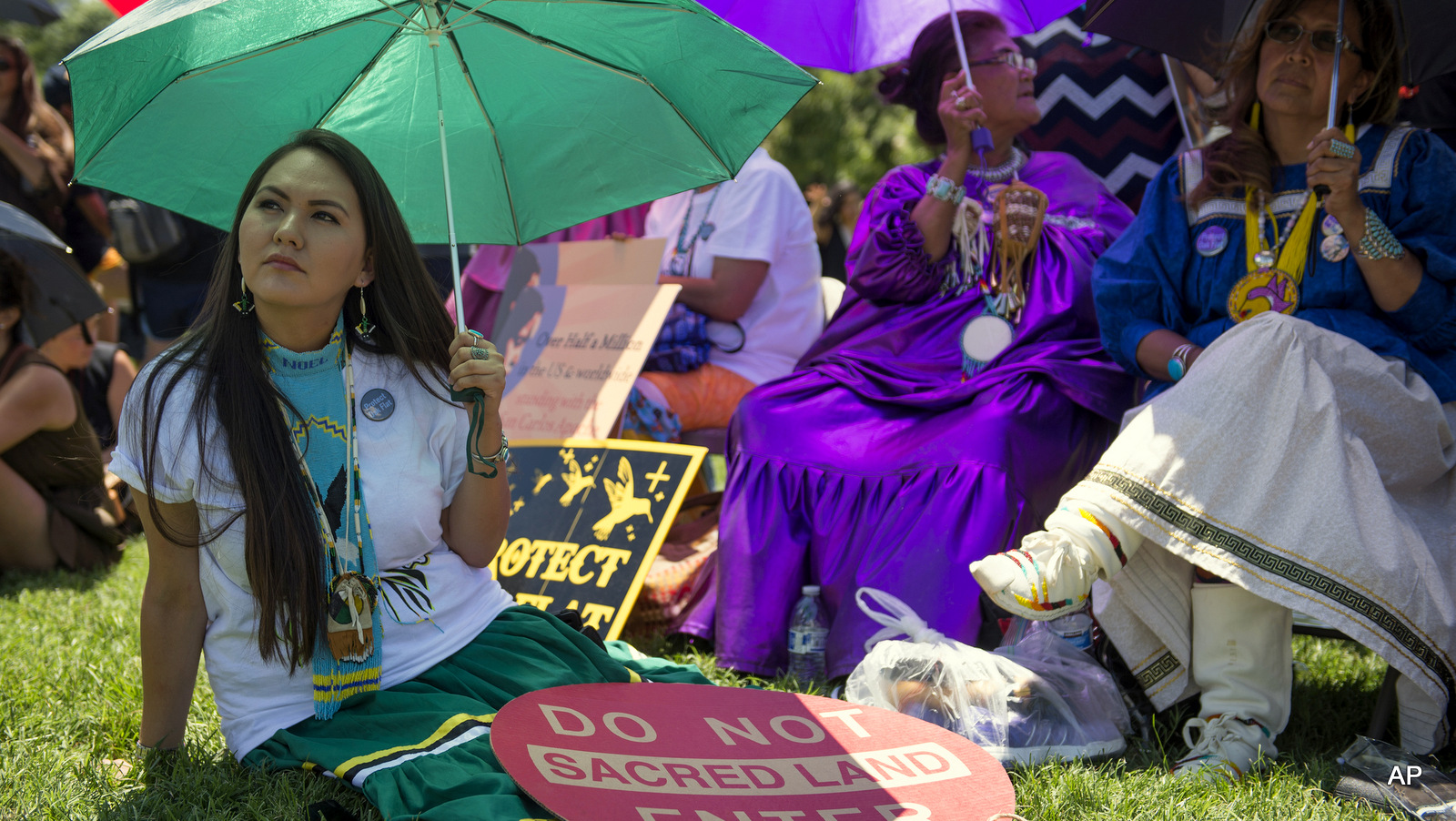
When the Stronghold attempted to meet with Rep. Gosar at his D.C. office the group was threatened with arrest by Capitol Police. As Vonda Cassadore, of Bylas, and other grandmothers with the Stronghold were forced to leave Gosar’s office, Censored News reports Cassadore warned: “We’ll remember this when Election Day comes around. Sacred land means more than money.”
Speaking to MintPress, Cassadore emphasized that the land swap will take away her ability to teach her 8-year-old granddaughter how to cook traditional Apache food. “If Oak Flat turns into a mine and we lose the acorn,” she said, “how am I going to show her how to do that?”
On July 21 and 22 the Apache Stronghold gathered outside the U.S. Capitol, where they sang songs, held prayer, and spoke to anyone who would listen to their plight.
“Today is our day. Today is our ceremony. We’re not here looking at this Capitol like it’s in charge of us,” Wendsler Nosie, an Apache Stronghold organizer and tribal councilman, told Reuters.
‘They won’t stop until the whole area is destroyed’
The Oak Flat area holds particular significance among the San Carlos Apaches, as it is near the Apache Leap cliffs where Apaches jumped to their death to avoid capture by American troops in the 1870s. The Stronghold set up camp on the site in February, pledging not to leave until the deal is repealed — a pledge they continue to honor.
Even before the Apache Stronghold formed, locals were resistant to the proposed copper mine. In March 2013, the nearby town of Superior voted unanimously to oppose the land deal. “We cannot afford this deal or support it until Resolution Copper Mine (RCM) comes clean,” said Soyla “Kiki” Peralta, a town council member, who cited concerns about water and the environment.
Also in 2013 the San Carlos Apache Tribe, Pascua Yaqui Tribe and Tohono O’odham Nation, along with 17 other Native American groups, sent a letter to Congress saying the deal tramples on the religious rights of Indigenous people.
Prior to the NDAA’s passage in December, opponents began circulating an online petition calling on the Obama administration to repeal the deal. After receiving over 100,000, signatures the White House responded.
Jodi Gillette, Special Assistant to the President for Native American Affairs, responded with a statement, which reads in part: “The public lands to be transferred have significant religious, cultural, historical, and archeological value to the San Carlos Apache Tribe and other tribes in the region. For these tribes, the area is sacred.”
“This is appalling, this would not happen at any other holy place in the world,”
Gillette also quoted a statement from Department of the Interior Secretary Sally Jewell, who said she was “profoundly disappointed with the Resolution Copper provision, which has no regard for lands considered sacred by nearby Indian tribes.”
Jewell’s statement continued, noting that Section 3003, which provides for the transfer of public lands to the private mining company, “short circuits the long-standing and fundamental practice of pursuing meaningful government-to-government consultation with the 566 federally recognized tribes with whom we have a unique legal and trust responsibility.” It also puts the tribe’s sacred land in “great jeopardy,” she added.
Despite Gillette’s assurances that the administration would “work with Rio Tinto (Resolution Copper’s parent company) to determine what can be done to work with the tribes to preserve these sacred areas,” Wendsler Nosie and the Apache Stronghold remain wary of Resolution Copper. Nosie told the Arizona Daily Star in December: “Oak Flat is where the creator, God, touched the earth for us. These are our ancestral home places.”
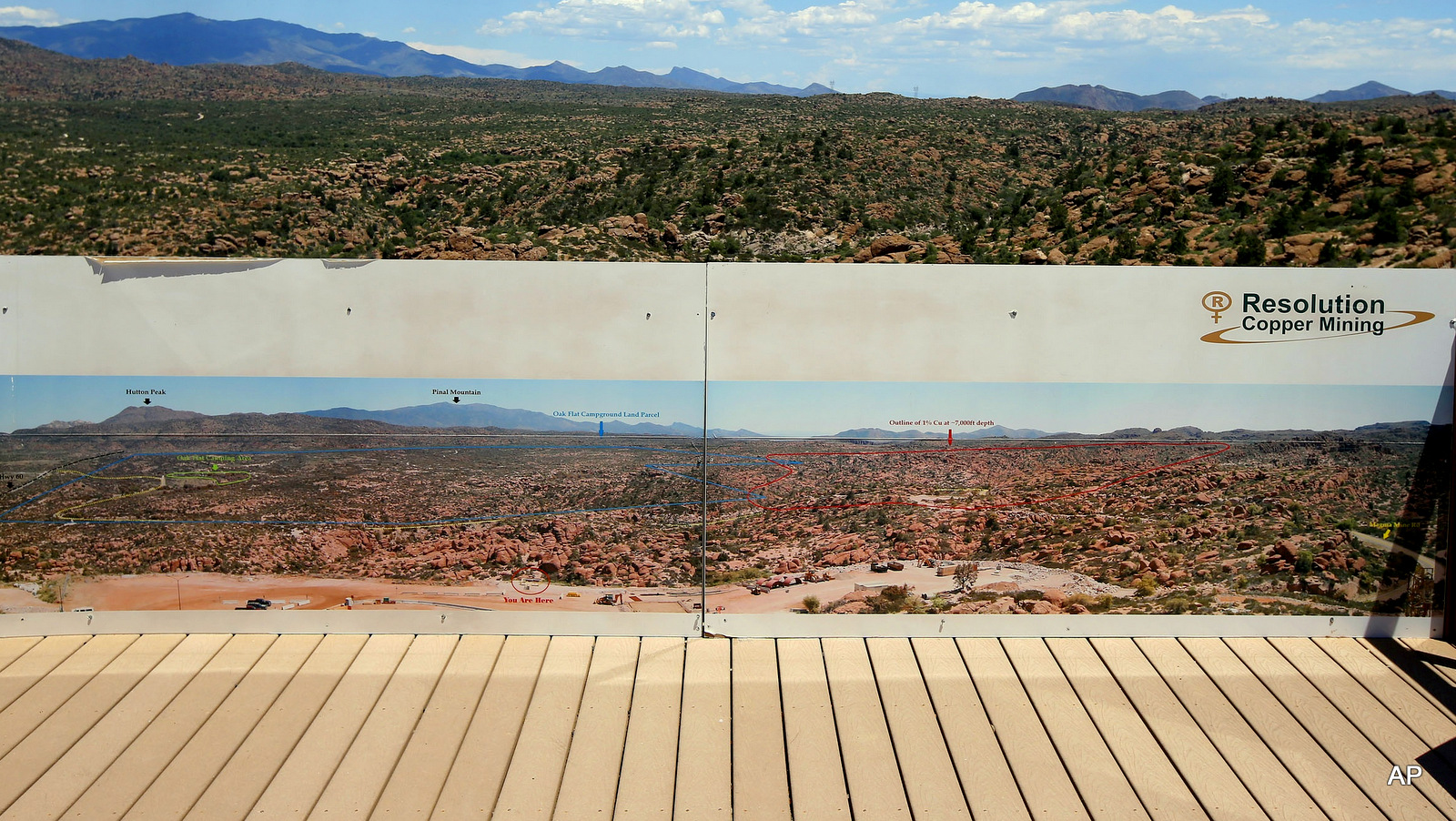
Despite the resistance to the deal, Sen. McCain and Resolution Copper stand by their assessment that the deal will bring thousands of new jobs to the area and take the Apache’s concerns into consideration.
After the NDAA passed McCain issued a statement on his website, arguing that “while a number of Arizona tribal governments raised concerns about the closure of a Forest Service campground called ‘Oak Flat,’ the bill guarantees that Native Americans can continue to access the campground for many years until the mining company needs to mine underneath it.”
“Passage of the legislation means that Resolution Copper can move forward with the development of this world-class ore body which will create approximately 3,700 jobs, generate over $60 billion in economic impact and result in almost $20 billion in state and federal tax payments,” project director Andrew Taplin said in a statement shared with MintPress in December.
And while the project is forecast to produce a billion pounds of copper annually, enough to satisfy one-quarter of U.S. demand, critics argue it’s unclear how much of that would actually be used domestically.
Further, members of the Apache Stronghold say the history of Resolution Copper’s parent company, Rio Tinto, does not offer much reason to trust their promises.
“We have seen what Rio Tinto did in past mines, once they start they won’t stop until the whole area is destroyed,” Reddog Rudy, an Apache Stronghold supporter, told MintPress.
A history of environmental degradation and corruption
As part of the land swap, Resolution Copper will be given unprecedented access to sacred Apache lands. Resolution Copper is a joint venture between Rio Tinto and BHP Billiton, formed specifically to develop and operate the copper mine near the Oak Flat campground in Superior, Arizona. With the launch of Resolution Copper, the multinational mining corporations face a new wave of scrutiny regarding their treatment of Indigenous populations and destruction of environments surrounding their mines.
Despite the job creation and economic factors at hand, critics point to past mining operations as proof that the company cannot keep its promises.
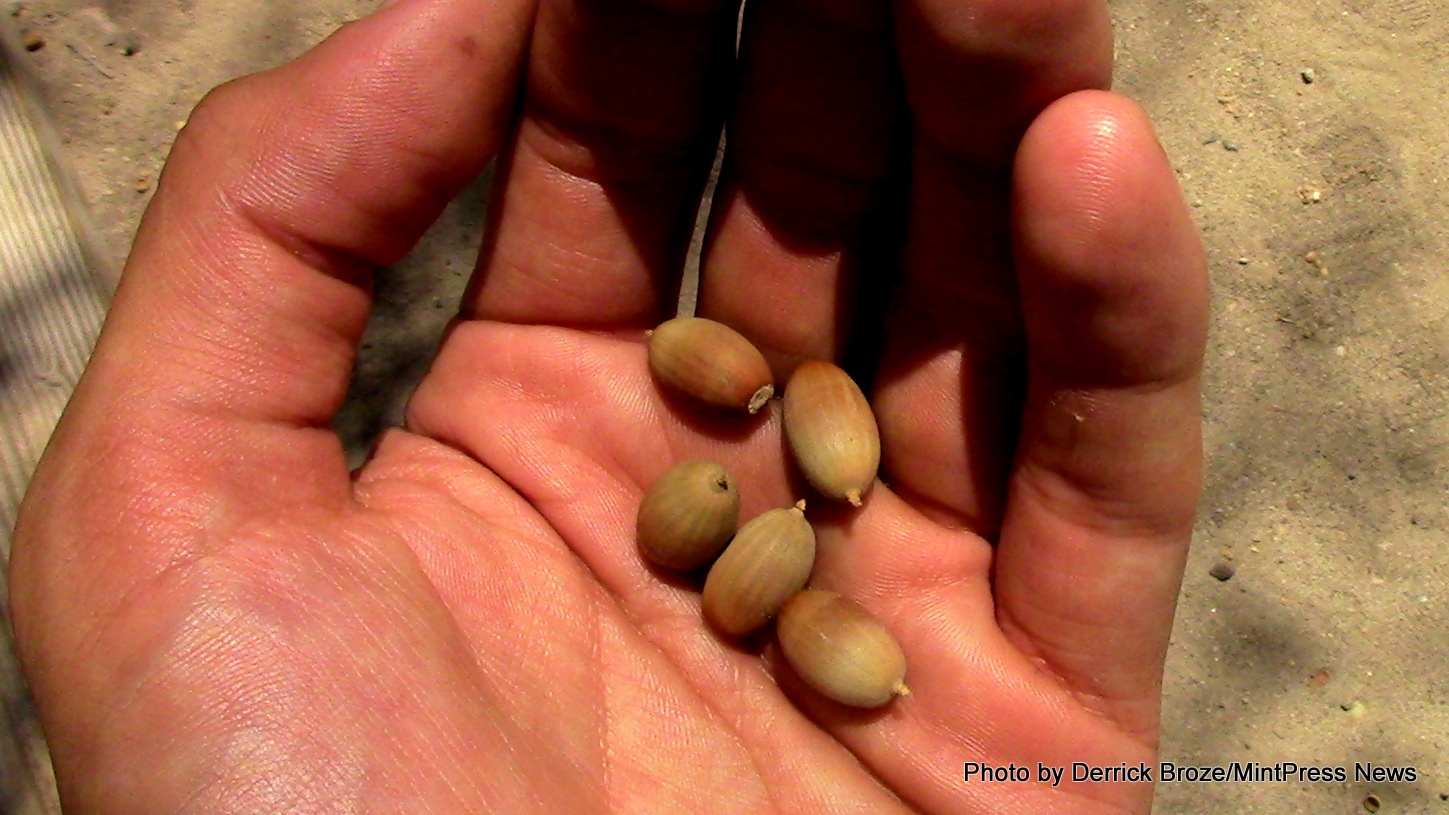
In September 2008, The Guardian reported that Norway’s Ministry of Finance would sell off the $780 million stake held in Rio Tinto by the Government Pension Fund, also known as the “oil fund.” Kristin Halvorsen, the Norwegian finance minister, told The Guardian that Rio Tinto’s involvement in a mining operation in Indonesia was problematic:
“Exclusion of a company from the Fund reflects our unwillingness to run an unacceptable risk of contributing to grossly unethical conduct. The Council on Ethics has concluded that Rio Tinto is directly involved, through its participation in the Grasberg mine in Indonesia, in the severe environmental damage caused by that mining operation.”
The Grasberg mine is the largest gold mine in the world and the third-largest copper mine, and certainly among the most scrutinized. A November 2007 study published by charity War on Want claimed that Rio Tinto were involved in human rights and environmental abuses. In addition to “massive environmental destruction,” the report states:
“Serious human rights violations have occurred near the mine, and the companies have regularly been accused of complicity in them owing to their reliance on the military and police to provide security for company operations. … Investigations in 2005 revealed that the Grasberg mine had paid Indonesian military and police officers nearly $20 million over the previous seven years. Individual commanders had received tens of thousands of dollars, while hundreds of thousands of dollars went to the Police Mobile Brigade, a paramilitary force known for human rights abuses, as well as an Indonesian general accused of human rights abuses during Indonesia’s occupation of East Timor.”
Rio Tinto responded to the report, stating: “There are many complex economic, social and environmental matters associated with mining … We are satisfied that our principles and standards are setting new benchmarks for responsible mining practices.”
In 2010, the International Council on Mining and Metals released “Good Practice Guide for Indigenous People and Mining,” which states that mining companies should work with Indigenous peoples and ensure full respect for their rights. The Apache Stronghold are waiting to see if Resolution Copper’s parent companies will abide by the standards.
Meanwhile, some critics of the land deal also point to possible backroom deals by Arizona Sens. McCain and Flake. In particular, they’ve noted that Rio Tinto contributed to McCain’s campaigns for the Senate.
Flake first came into contact with Rio Tinto in the early 1990s while working for Rossing Uranium. The National Journal reported in 2012:
“Between 1990 and 1991, Flake was a registered foreign agent for Rossing Uranium, a company which operates a mine in Namibia that is among the world’s largest suppliers of the nuclear fuel. He earned between $5,000 and $7,000 per month opening doors in the nation’s capital and promoting the firm.”
Rio Tinto owns 69 percent of the Rossing mine. Speaking with Democracy Now! earlier in July, Wendsler Nosie, the Apache Stronghold organizer and tribal councilman, suggested Flake’s past lobbying efforts may have influenced the land exchange.
Noting Flake’s lobbyist past and the source of McCain’s campaign contributions, Nosie told Amy Goodman: “So, if people—if Americans can just backtrack, then you’ll see the ties that they [Resolution Copper and Rio Tinto] have with these two individuals.”
‘The war on who we are as human beings is happening day to day’
Back at the Oak Flat campground on July 27, five members of the Apache Stronghold rested after their journey to Washington. None of these young men are from the San Carlos Apache Reservation, and none are of Apache descent, but they were each inspired by Wendsler Nosie and the Apache’s struggle.
“These are different times, with different tools, but it’s the same struggle since colonization and contact,” Anthony Sul, with the Ohlone Rumsen of California, told MintPress. Although Sul is not Apache, he says his people share the Apache’s deep connection to the Oak trees and acorns.
“I am here supporting because this has been continuing for a long time and there comes a time when we say we have had enough. This generation is finding our way. How do we let people know that we have had enough, that the Earth has had enough?”
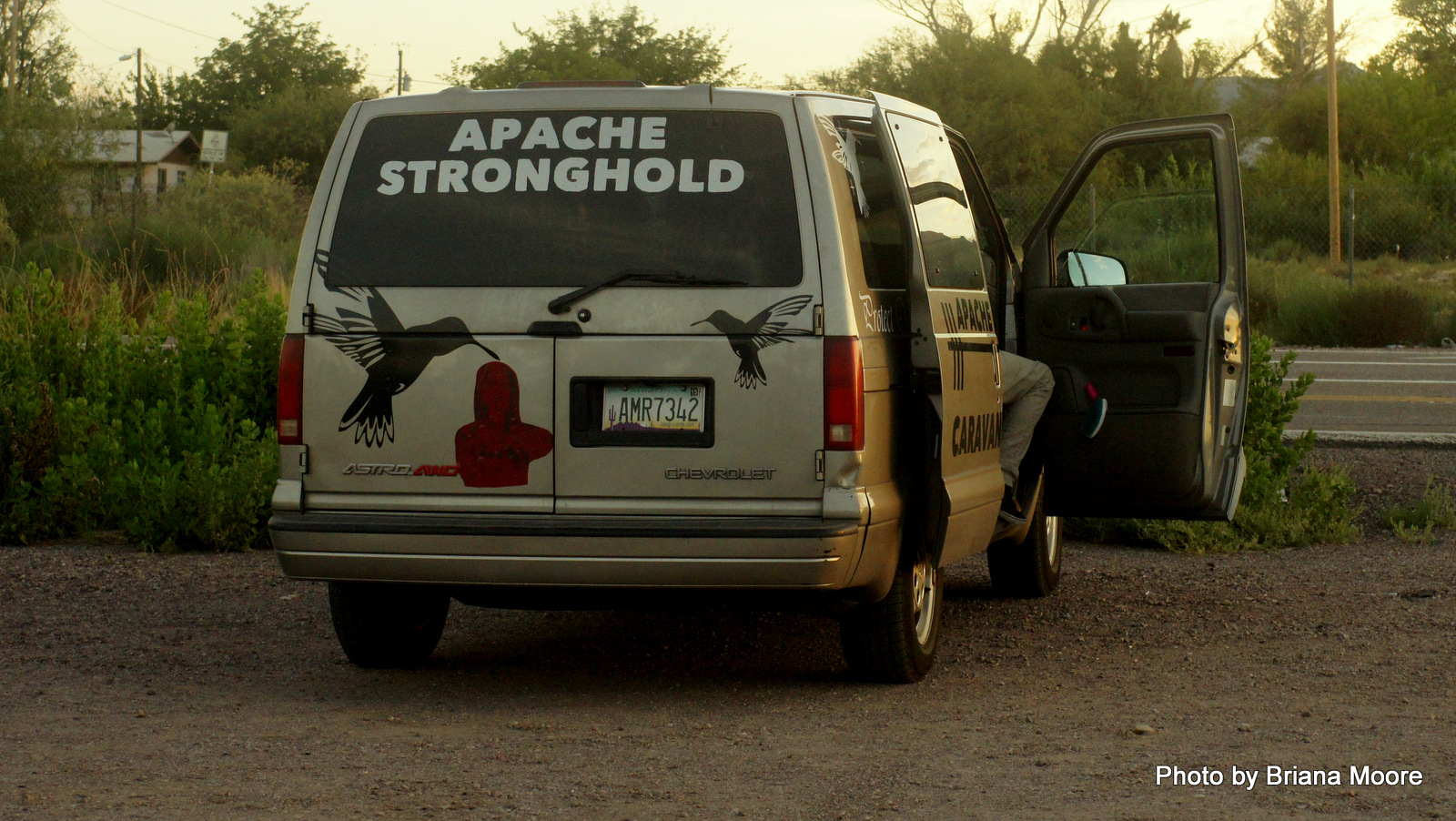
When the Apache Stronghold made it to Washington, they arrived in support of a bill recently introduced by Congressman Raúl Grijalva of Arizona, which would reverse the NDAA’s Section 3003 allowing for the land swap. When introducing the bipartisan Save Oak Flat Act, Grijalva said: “Congress shouldn’t be in the business of helping big corporations at others’ expense, and it certainly shouldn’t break faith with Native American communities.”
In a statement, Sierra Club Executive Director Michael Brune called the land deal “disappointing,” urging Congress to “immediately pass Congressman Grijalva’s bipartisan bill that reverses this terrible land swap and finally begin to honor their promises made to Native Americans.”

Kooper Curley, of the Diné Nation, says the battle is far from over for Native Americans. Curley, a hip hop performer who goes by Indigenize, was leaving Oak Flat for Salt Lake City, Utah, to join the Utah Tar Sands Resistance in their fight against tar sands and tar shale mining. “The war is not over, the war on who we are as human beings is happening day to day,” he told MintPress.
But as the Apache Stronghold’s recent journey to Washington demonstrates, they are not alone in their fight. The Oak Flat campground was recently named one of America’s 11 most endangered places by the National Trust for Historic Preservation.
Reddog Rudy, the Apache Stronghold supporter, says today’s Indigenous struggle against colonization is “a spiritual movement that has had to counter the political movement that stole from us.” Rudy is a member of the Denver chapter of the American Indian Movement, the 1960s activist group that brought Native American struggles to the forefront of American politics through radical actions such as occupying Alcatraz Island and battling federal agents at Wounded Knee.
“Those of us who grew up in AIM, we still have our connection to our uncles, Russell Means and John Trudell. We want to do as much as they have done,” Rudy told MintPress. “They brought back the way to be proud of being Indian. They started to grow their hair long, and bring back the ceremonies. It was illegal to practice our spirituality until 1978.”
As Resolution Copper prepares to take over the area surrounding the Oak Flat campground, the Apache Stronghold remain committed to protecting their history, their land, and their people against the still-lingering effects of colonization. For the Native American men, women and children who support the San Carlos Apache this struggle is all too familiar. For the warriors of the Apache Stronghold, the current events represent the unfolding of prophecy. Still, after 500 years of lies, theft, and murder, the community continues to draw strength from spirituality and prayer.
“Our prayer goes beyond Oak Flat to the universe, so we can find balance,” Rudy said. “We want everyone to have clean water. The four-leggeds, the birds, the swimmers, the whales and the dolphins. We want all them to live. That’s what we pray for.”


